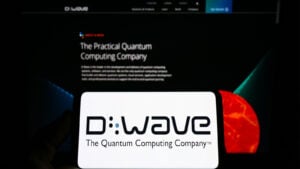
Quantum computing stocks on the whole took a generous hit in April, mostly due to the market’s realization that interest rates will not be going down any time soon. Moreover, the U.S. Labor Department’s most recent report on inflation has stymied any hopes of a near-term rate cut, with the most likely date for cuts now occurring in September of 2024 if inflation continues to cool. According to the report, year-over-year inflation numbers decreased from 3.5% to 3.4%. Most consumers won’t notice, but it shows the right trend and might motivate larger corporations to rethink expenditures.
After all, the world of quantum computing relies heavily on expenditures in the esoteric. Many of the investments made today to progress the technology may not see maturation for decades to come. As such, investors should be very picky about which quantum computing stocks to buy. Not all are created equal, and may not have equal shares of the future of this revolutionary technology.
International Business Machines (IBM)

I’ve been bullish before on International Business Machines (NYSE:IBM) due to its contributions to artificial intelligence and nanomaterials. Many of the company’s advantages in the world of technology come from its mastery of computer design and manufacturing. Nowhere is this more evident than in IBM’s quantum computing projects, which offer a return to massive supercomputers of the 20th century, yet at computing speeds exponentially more powerful.
From its Quantum System Two to the new Heron Processor, IBM is constantly on the cutting edge of quantum technology and shows no signs of slowing down. For investors, this means investing in a company with both the capital and reputation to lead in new quantum technologies.
Furthermore, IBM is incredibly well-diversified, touching several industries from consumer to corporate computers, to AI models and beyond. Thus, even if its quantum computing projects underperform, IBM has diverse ways to make it up to investors.
D-Wave Quantum (QBTS)

Branding itself as the practical quantum computing company, D-Wave Quantum (NYSE:QBTS) still sits at a significant discount from its special acquisition company merger (SPAC) price of around $10. Two years after going public via the SPAC, the company has lost 87% of its value. This means trouble for anyone who bought into it then. However, the tides are turning for D-Wave Quantum’s stock, as the company has one of the most pertinent business models in quantum computing stocks to buy list.
By leveraging its resources in quantum computing data centers, the company offers The Leap quantum cloud service, which makes the power of quantum computers available for a fraction of the price. Subscribers can use quantum cloud computing to solve mathematical algorithms at fractions of the speed of traditional computing.
Ultimately, this business model has resulted in the company’s Q1 2024 revenue up 56% year-over-year (YOY) with Q1 bookings up 54% YOY and gross profit up 294% YOY. As such, QBTS could easily be a quantum computing stock to buy due to sheer value for money.
IonQ (IONQ)

From a quantum computing technology standpoint, IonQ (NYSE:IONQ) still offers some of the most compelling computers on the market. That’s because IONQ’s proprietary design relies on electromagnetism and atomic interactions to perform sustained calculations. From a quantum mechanics standpoint, this allows for solving far more complex and time-consuming algorithms. These computers are also exceptionally scalable to customer needs, making them versatile.
This is why I recommended the stock back in March 2024. Now I’m doubling down on my recommendation thanks to its recent Q1 2024 report showing decent revenue growth. Though somewhat meager, its $7.6 million in revenue for the quarter represents a 77% growth year-over-year. Moreover, the company is keeping generous cash reserves at $434.4 million to maintain operations and research around its projects.
Bearing all this in mind, analysts have awarded the stock strong buy ratings for now. As a result, investors looking for a pure-play in quantum computing should not pass up IONQ.
On the date of publication, Viktor Zarev did not have (either directly or indirectly) any positions in the securities mentioned in this article. The opinions expressed in this article are those of the writer, subject to the InvestorPlace.com Publishing Guidelines.






